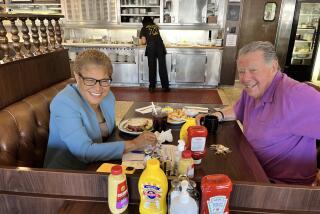Exit the Mayor of Spring Street
- Share via
They called Ray Post the Mayor of Spring Street because he knew everyone around and kept a sense of order in the area just south of 6th, where order isn’t always easy to keep.
As doorman to a residential building called Premiere Towers, Post chased away junkies, asked winos to move on and sometimes gave homeless people a couple of bucks to get something to eat.
Bums called him “Mr. Mayor” and cops told people asking directions to “Go see the Mayor” when they couldn’t answer the questions themselves. Post knew where you could get a decent cup of coffee or buy a stereo or fit yourself for a new pair of shoes.
He’d been doorman at the 12-story building since 1986, taking the job just a few years after the Community Redevelopment Agency engineered the renovation of two older buildings into 120 condo units, with grand plans to revitalize downtown.
A burly, good-natured man with a wave and a smile for everyone, Post became a metaphor for the optimism that prevailed at the time: a solid kind of guy on the shaky rim of Skid Row.
His municipality stretched from 1st to Olympic and from Spring to Olive. He became so well known that the L.A. City Council passed a resolution declaring him the Mayor of Spring Street, and giving him a jacket with his title on the back.
But the Redevelopment Agency’s dream of a revitalized downtown didn’t pan out. The condos didn’t sell, the building changed hands a couple of times and the budget tightened around Ray Post’s neck.
A few weeks ago, they fired him.
*
“It was an efficiency move,” a spokesman for the CRA told me, but the agency didn’t do it with a lot of grace. Post got the word five minutes before quitting time and, despite seven years as doorman, received no severance pay.
We met the other day at the building, which was difficult for him. He misses the job and the people and had a hard time going back to a place where he no longer belonged.
“It was more than a job,” he said as we stood in the foyer of the elegant old building. “It was my life. I’d been a doorman in other places, but when I got here I knew it was different. This was home. I loved it.”
If there was any doubt that the tenants felt the same, it vanished when an elevator door opened and three of them stepped out. They hugged Post with more emotion than I’ve seen in a long time and said they missed him and wanted him back.
He was more than a doorman to them. He tried to keep them safe by keeping them inside when they weren’t working. He did this by arranging cleaning pickup and delivery, a carwash service, a video rental service and other niceties.
Post worked 16 hours a day at the building, eight as a doorman and eight as a security guard, so he was there most of the time. Sometimes he’d come early and be at his post before sunrise, like a sentry in a war zone.
“It’s a bad neighborhood,” Post said, “and I wanted to take care of everybody. It was important.”
*
Once a drug user himself, he worked hard to keep the dealers away, especially from behind the building in a “crack alley” where they once did a $10,000-a-day business.
Post did it with a style that was effective but nonaggressive. He never had to fight anyone. “You treat people with respect,” he said in a coffee shop not far from his building, “and they’ll treat you with respect. Treat them like dogs and you’ll get bitten.”
Eventually, the alley was fenced off, but not before Post helped arrange a marriage between two users who lived back there. The man was known as J.B. and the woman called herself Pancho.
Post used to pay them out of his own pocket to sweep up, and had faith that J.B. could become a good citizen someday. After the marriage, both J.B. and Pancho straightened out, quit drugs and went to work. Now they have a home and a child.
“I’m so proud of them,” Post said, “that when I think of them I get cold chills.”
“It was a staff reduction,” the CRA spokesman said when I talked to him about the Mayor of Spring Street. “We were cutting costs.”
Premiere Towers is only about 50% occupied. Everyone’s still optimistic that the street can be made safe and enticing, but it just won’t be the same without Ray Post.
Times are hard and it’s not easy bringing new life to an area perceived as Skid Row, but the $1,500 a month Post was earning as doorman wasn’t the difference between success and failure.
The so-called new Downtown seems sadly empty without him. He cared very much for the people around him, and that ought to be an equation of the future too. Without it, we’re all a lot less than the areas we improve.
More to Read
Sign up for Essential California
The most important California stories and recommendations in your inbox every morning.
You may occasionally receive promotional content from the Los Angeles Times.













